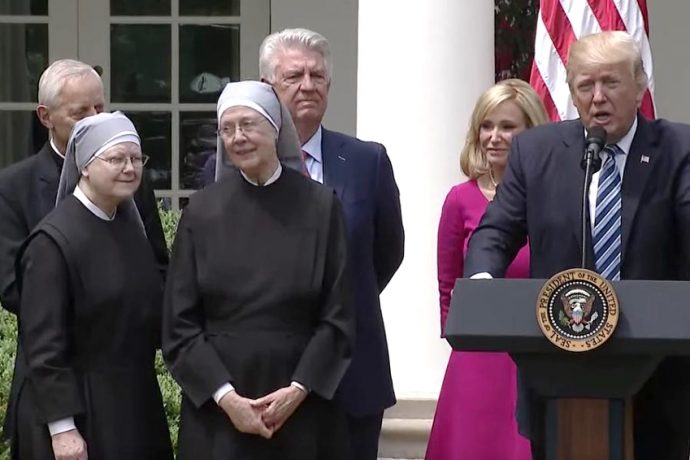There were two major winners in Trump’s long-expected executive order to gut ObamaCare’s contraceptive mandate: the Catholic bishops, who ginned up this particular culture-war debacle in the first place, and the evangelical right, which was happy to take up the fight once they realized it meant limiting women’s reproductive choices.
Losers, of course, are the potentially hundreds of thousands of women who will lose contraceptive coverage. As Linda Greenberg noted in the New York Times, “It’s hard to overstate the radical nature of what has just happened”:
The new rules, which went into immediate effect, create exceptions that are anything but limited. They are, in fact, there for the taking. Any “entities” that claim not only religious but also “moral” objections to birth control are entitled to refuse to comply with the federal contraception mandate that until last Friday was enabling 55 million women to receive birth control without charge as part of their work- or college-related health insurance coverage.
This, of course, is exactly what the Catholic bishops were gunning for all along—a total exemption from the mandate for anyone who wants it merely for objecting to the provision of birth control with no work-around for the women involved. “These regulations are a cheaply calculated move by President Trump to pander to his ultra-right base. This purely political decision is not about protecting religious freedom, but about privileging one set of special interests at the expense of women nationwide,” said Sara Hutchinson Ratcliffe, vice president of Catholics for Choice, in a statement.
Coupled with the administration’s new guidance on religious liberty, which leans heavily toward the right-wing definition of religious liberty, it’s clear that these culture war battles over religiously motivated opt-outs and exemptions will become a permanent feature of our society as religious conservatives seek to consolidate and expand their gains. Looking ahead to the religious liberty fights of the future, there are three lessons that can be learned for the fight over the contraceptive mandate.
The first is that narratives, not facts, move culture war debates. It doesn’t matter that an IOM panel recommended the inclusion of the contraceptive mandate in the list of no-brainer preventative services that should be included in the basic cost of a health care plan. It doesn’t matter that all the evidence shows that contraceptives are overwhelmingly safe and beneficial to women and society. It doesn’t matte that a lack of contraceptive access, especially to the more effective long-term kinds, drives up rates of unplanned pregnancy and abortion. It doesn’t matter that a ridiculously high percentage of Catholic women use “artificial” means of birth control or that emergency contraceptives aren’t abortifacients, even as the Catholic bishops screamed that Catholics were being forced to effectively subsidized abortion.
It was that narrative, that believing Catholics were being forced to go against their religious beliefs to support abortion, which—just like Trump does with his racist dog-whistles—exposed the old scars of anti-Catholicism and turned many conservative Catholics against not only the mandate but the ACA and the Obama administration. It was the Becket Fund’s stroke of genius to further perfect and humanize that narrative by making the self-sacrificing Little Sisters of the Poor the face of gentle Catholic opposition to the big government’s abortion-pill pushing.
The second lesson is that culture war politics make strange bedfellows. Historically and theologically, most evangelical denominations haven’t been particularly hostile to contraception. But as I’ve noted here in RD, that began to change around the early 2000s. Not only did evangelicals cotton to the sexually conservative framework of Humanae Vitae at a time that the idea of male headship was making a resurgence in the evangelical mainstream, but they instantly recognized the beauty of the Catholic bishops linking of birth control and same-sex marriage under a religious liberty frame.
But the most important lesson is that from small wedges, big things can come. What is now a major culture war issue began as an obscure insurance matter. The Catholic bishops worked throughout the 1980s and 1990s to ensure that Catholic health plans participating in government programs were allowed to take a pass on providing abortion and then contraception. They ratcheted up the pressure for exemptions when the FDA approved emergency contraceptives in the late 1990s.
Right now it’s bakers and photographers who are making the strongest claims for religious liberty exemptions because they’re asserting that it’s a matter of creative expression. But what about the future? With everything from mortgage lenders to trucking companies asserting they are being guided by “Christian principles,” isn’t it just a matter of time before one such company asserts their right, as a closely-held Christian company, to refuse serve a person or persons with what they consider a sinful lifestyle, be it a same-sex couple or a transgender individual, in a matter as personal and explicitly tied to couple-hood as getting a mortgage or moving house?
Already Cherry Creek Mortgage, which calls itself a “Christian-based company,” has allegedly refused to cover the wife of one of their female employees in the company’s health plan, prompting a lawsuit in California. It’s seems doubtful that given it’s current composition and past sympathy toward brazenly broad religious liberty claims the Supreme Court will fail to support these obviously oppressed Christians. The only question now is how far they will get with their claims.




